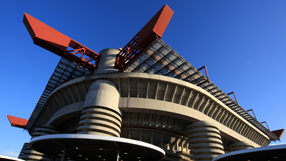
No Serie A side owns their own stadium and Inter Milan are among more than 20 Italian clubs planning to build their own arenas or renovate and take over existing ones, many eyeing Italy's bid for the 2016 European championship.
English and Spanish sides have outstripped Italian counterparts on and off the field in recent years thanks in part from revenue from their own, ultra-modern, stadiums.
"Italian soccer has to reinvent itself. The clubs usually do not own the stadiums and Italy will have to reassess its economic model for soccer to set out the new path to be followed," said Jose Maria Gay Saludas, an expert on football economics at the University of Barcelona.
State-of-the-art stadiums may also draw foreign investors, whose interest in Italian clubs has been minimal so far.
"If you build a new stadium your attendances can increase by 40-50 percent and your revenues can go up by as much as 66 percent," Mark Roberts, senior consultant in the Sports Business Group at consultancy Deloitte, told Reuters.
But "stadiums have to be used seven days a week" to repay their high costs, not an easy task in a country where match attendance is one of the lowest in Europe, said Paul Blakey, lecturer in Sports Sciences at Britain's Northumbria University.
MIXED FORTUNES
Italy lags behind Europe's top leagues in terms of match income, with 62 percent of revenues coming from television rights, according to Italy-based sports consultancy StageUp.
The best features, fun and footballing quizzes, straight to your inbox every week.
Gate receipts accounted for 12.7 percent of revenues at AC Milan and 13.3 percent at AS Roma in the 2007/08 season, compared with Manchester United's 39.4 percent, the latest Football Money League report by Deloitte showed.
"In contrast to the clubs in Serie A, where 80 percent of stadiums are an average of 67 years old, some of which are dilapidated, the investments of German and English clubs have led to constant increases in attendance and ticketing revenue," said Andreas Ullmann, Head of Market Intelligence at German-based sports marketing agency Sport+Markt.
Serie A's average match attendance has dropped by 3 percent to 23,900 this term on the previous season, according to the Italian league's preliminary estimates.
Nonetheless, experts say gate receipts alone are not enough to restore Italian clubs' finances, hit by the recession and unsustainable levels of debt.
"English football clubs have had very mixed fortunes in terms of the benefits that new stadiums have brought them, both on and off the pitch," said Chris Brooks, professor of finance and director of research at ICMA Centre, University of Reading.
EURO BID
The catalyst for stadium investment is the expanded 2016 European championship, with Italy competing against France, Turkey and a joint bid from Sweden and Norway.
Italy, which last revamped stadiums for the 1990 World Cup, lost out on Euro 2012 to Poland and Ukraine.
A landmark law designed to help clubs build their own grounds, which passed its first parliamentary hurdle last month in a rare unanimous vote, could come into force before February's deadline for bid dossiers or May's
 Join The Club
Join The Club





